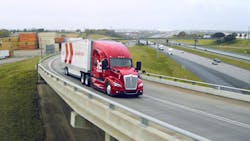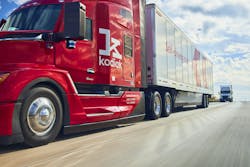With the development of autonomous vehicles ramping up, the trucking industry is faced with the challenge of learning about AVs and adding them to their fleets.
But this doesn’t mean we’re about to see scores of driverless semis on highways across the U.S. anytime soon.
“I think people still have this notion of AV or not,” said Stefan Heck, founder and CEO of Nauto, an AI and data platform for driver coaching, safety, and AV development. “And I think that’s the wrong notion. There won’t be a date of March 5, 2027, and boom, AVs are on the road. It’ll be gradual.”
Despite not having a definitive date, we can explore where autonomous trucking development is now and what advantages AV providers and fleets have found so far.
Additional AI articles of the week
- This is Part 1 of a two-part series originally posted on Fleet Maintenance. You can read Part 2 here.
- AI: On the road to limitless potential
- Unlocking AI’s complex interpretations to increase efficiency and productivity
- AI is a tool worth exploring
- 10 Ways to Integrate AI into the Specification Process
Gains and losses
The end of 2023 saw a flurry of growth milestones for several of the remaining AV players in the segment. AVs took the stage with some frequency at 2024’s Consumer Electronics Show, with Kodiak Robotics, Aurora Innovation, Torc Robotics, and Gatik AI all making appearances.
In January, Kodiak also debuted its driverless-ready Class 8 truck and opened an AV truckport with Ryder in Houston. In addition, the company recently unveiled an autonomous test Ford F-150 for the U.S. Department of Defense, with whom Kodiak currently has a contract for two off-road-capable vehicles for reconnaissance. In February, Kodiak and supply chain solution business Martin-Brower Company unveiled autonomous refrigerated deliveries, which take place eight times per week for restaurants between Dallas and Oklahoma City. Trucks with the Kodiak Driver still use safety drivers, but the company plans to launch its first driverless operations from Dallas to Houston this year.
Aurora and Continental are currently finalizing the design and architecture of Aurora’s Level 4 autonomous platform, too, and plan to begin production in 2027.
Torc, a subsidiary of Daimler Truck, plans to commercialize a Level 4 AV Freightliner Cascadia by 2027. The Virginia-based company is currently working with Aeva to integrate automotive-grade 4D lidar for their AVs, as well.
Navistar is also making progress as it gears up to launch an autonomous commercial pilot program with customers. The OEM is currently involved in a new partnership with Plus to integrate its Level 4 autonomous SuperDrive technology stack into international vehicles and other branded vehicles within the Traton Group. Trucks equipped with the Plus technology are being validated with a safety driver on routes in Texas. Customer pilots are expected within the year, with commercial deployments expanding incrementally along strategic U.S. corridors.
See also: Kodiak launches next autonomous truckport at Ryder facility in Texas
Finally, Gatik AI, which first commercially deployed its driverless operations in 2019, plans to scale up its B2B operations in Dallas, Texas, in 2024. At CES, Gatik showed off its work with Goodyear to incorporate intelligent tire solutions into much of its autonomous fleet in the U.S.
Some AV developers, though, have struggled. Waymo, an autonomous driver developer, pulled back on its AV trucking efforts in July 2023 in favor of focusing on its ride-hailing service instead. The company has stated that it is still interested in working with Daimler Truck North America on an autonomous Cascadia, but for the time being, their development timeline has been pushed back.
And while some AV companies have grown or pivoted to development in new sectors, others have exited the U.S. playing field entirely. For example, autonomous startup TuSimple, which Navistar had once had a minority stake in, has abandoned its U.S. operations in favor of China and Japan as of November 2023. This comes after a tumultuous 2022 for the company, when TuSimple fired its CEO, president, and chief technology officer Xiaodi Hou and rehired Cheng Lu. In the same year, Jim Mullen, TuSimple’s then-chief legal and administrative officer and former acting administrator of the Federal Motor Carrier Safety Administration, resigned. To top it all off, company investors also filed a lawsuit against the company for alleged securities fraud.
Legislation and pushback
Autonomous trucks also face a range of legal issues, depending on what state they’re in. As an example, California Gov. Gavin Newsom recently vetoed Assembly Bill 316, which would have banned driverless truck testing and operations in the state.
Other states have considered banning AVs as well, such as Indiana’s House Bill 1022 and New York’s S7758, both of which would require human operators for AVs, specifically those over 10,000 lbs. for New York’s legislation.
On the other hand, 23 states currently allow driverless truck testing, and some states are considering legislation that would loosen regulations, such as Tennessee’s HB 0139, which would only require AV operators at the head of a platoon. In other cases, regulatory framework for operating fully autonomous vehicles has been abandoned altogether, such as Kentucky’s H135, which was vetoed in April 2023.
This has led to some tension with groups such as the Owner-Operator Independent Drivers Association, which has expressed concerns regarding AV safety and frustration over the regulatory differences between AVs and human truck drivers.
“One of the biggest factors here that drives me crazy is that truckers are so heavily regulated—and continue to have more regulations piled atop them day after day,” said Lewie Pugh, EVP, OOIDA. “And yet, we’re talking about letting AVs come out here with unproven technology, with nobody even driving the truck, and we want to loosen the regulations to make it easier for them.”
This isn’t to say that OOIDA members would be opposed to AVs, as long as regulations keep pace with technological development.
“I think that someday in the future, if this technology is proven to be safe and has the correct restrictions put upon it, I do believe that there’s places where this will work,” Pugh added.
Part of meeting that safety threshold means consistency in regulatory testing, noted George O’Connor, director of communications, OOIDA.
“When it comes to testing, data transparency is what we’re looking for from these companies,” O’Connor emphasized. “They seem to be doing a lot of testing, but then they keep their data to themselves. I think that lawmakers, the general public, and regulators should be able to take a look at some of this data if these trucks are going to be on public roadways.”
About the Author
Alex Keenan
Alex Keenan has been associate editor for Endeavor's Commercial Vehicle Group, which includes FleetOwner magazine, since 2022. She has written on a variety of topics for the past several years and recently joined the transportation industry, reviewing content covering technician challenges and breaking industry news. She holds a bachelor's degree in English from Colorado State University in Fort Collins, Colorado.

